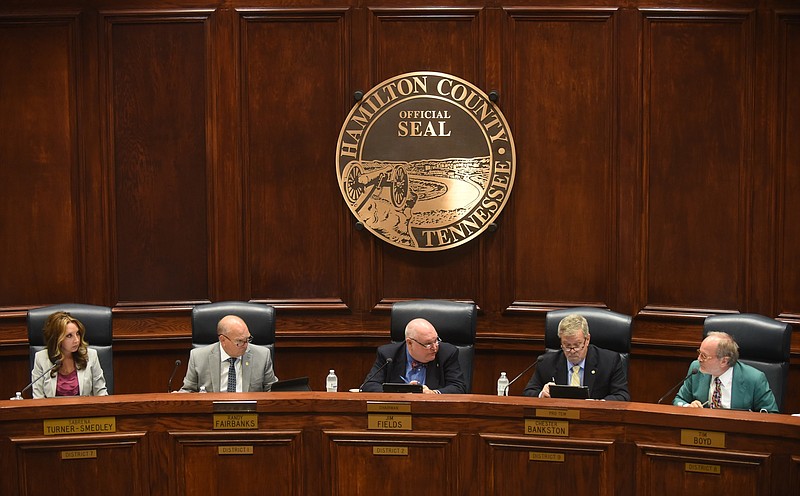Read more
Hamilton County commissioners wanted to use returned discretionary funds
They say democracy happens one vote at a time.
Actually, it's more complicated than that.
Our Hamilton County commissioners' recent struggles over individual control of $100,000 each in discretionary funds is testament.
The commissioners' continuing money/power grab has been playing out in headlines for about two years and probably a dozen votes - actually more votes if you count the times commissioners have given their collective nods when first one or another would submit resolutions to use portions of their dole for a veterans park in Collegedale or a piece of public art in Brainerd or a piece of equipment to a sports booster club.
You'll recall that our nine commissioners at budget time stood with county Mayor Jim Coppinger and steadfastly refused to pull a penny out of county savings to help put more funding in schools or in public safety. But when the mayor, seeking to balance the budget without a tax increase, left their nearly $1 million in discretionary spending funds out of the 2016 budget, those same commissioners voted 8-1 to amend the budget and raid the rainy-day savings fund. They were not about to give up their habit of nickeling-and-diming their way to favor and votes. The mayor vetoed their change, but commissioners overrode the veto.
This week brought more drama when Commissioner Joe Graham, the lone vote for not retrieving discretionary money from savings, and Commissioner Marty Haynes, who is running for property assessor, fought to return their collective $200,000. But other commissioners amended the resolution to move the funds instead to Orange Grove, a local nonprofit that provides about 400 jobs to mentally-challenged adults in programs that include a recycling processing center - something that benefits all of Hamilton County residents.
To be cliche, seeking to hijack the returned money for a "safe" expenditure like Orange Grove to discipline the mavericks in the slush fund/name recognition game was like putting lipstick on a pig. And it ignored the real issue.
All of the discretionary funds need to be returned.
For years, these funds have been doled out in dribbles like candy. That candy distracts both the commissioners and the public from finding ways to fund the truly serious needs facing our community. Needs like early childhood education, a new jail, improving the Sheriff's Department, funding school technology - things that benefit every citizen.
If commissioners were more forward thinking, they would understand that discretionary funds actually hurt them and their districts. Throwing out the candy makes them believe they are helping, rather than just greasing the squeakiest wheels closest to home.
In the debate Wednesday that ended, rightly (on a slim 5-4 vote), to return Graham's and Haynes' money to savings, commissioners Greg Beck and Warren Mackey said without discretionary money their largely minority districts would get nothing.
We beg to differ. Perhaps if you (and all commissioners) and groups you reward were not so distracted by the candy, you might all fight harder for the bigger needs in your districts - for example, the early childhood development project that the Creative Discovery Museum earlier this year planned in Alton Park's Calvin Donaldson Elementary School. That project would have served up to 400 youngsters, but it stalled when a $500,000 ask of the county was denied by Mayor Jim Coppinger, citing - you guessed it - a lack of funds. The city already had committed $500,000 and local foundations were lined up, too.
The discretionary funds from five commissioners would have paid for it, but at the moment it's off the table.
On the bright side, all these votes over all these years just brought us $200,000 closer to good fiscal sense.
At least we're talking about it, finally.
